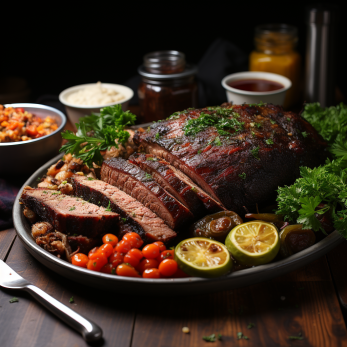
Introduction
Brisket has earned a reputation as the holy grail of smoked meats, especially in places like Texas, where it has transcended mere food status to become a part of cultural identity. The transformation of this once-cheap cut of meat into one of the most expensive and sought-after delicacies is indeed a culinary marvel. However, it's time to shed light on an unexpected truth about brisket and why you may want to think twice before grilling it.
The Brisket Boom
Traditionally, brisket was considered a less desirable cut of meat due to its toughness and lack of flavor. But through careful preparation, seasoning, and slow cooking, culinary enthusiasts have turned this cut into a tender, flavorful masterpiece. It's the transformation from a hard, chewy piece of beef into a melt-in-your-mouth experience that has made brisket a favorite among meat lovers.
The Hidden Dangers of Grilling Brisket
Despite its popularity, there are serious concerns when it comes to grilling brisket at high temperatures, and these reasons might make you reconsider your cooking methods.
1. Potential Carcinogens Formation:
Grilling brisket at high temperatures can lead to the formation of carcinogenic compounds like heterocyclic amines (HCAs) and polycyclic aromatic hydrocarbons (PAHs). These compounds have been linked to certain types of cancers.
2. Loss of Nutrients:
The intense heat from grilling can break down the nutrients in the meat, making it less healthy. This is particularly true for brisket, which requires careful handling to preserve its taste and texture.
3. Environmental Impact:
Grilling brisket, especially using charcoal, contributes to air pollution. The smoke produced contains harmful chemicals that can negatively impact the environment and your health.
4. Quality and Taste:
Grilling brisket at high temperatures can compromise its quality and taste. The slow cooking method that makes brisket so delightful can be undone if the meat is exposed to high heat, leading to a dry and chewy texture.
Alternatives to Grilling
If you're now thinking twice about grilling brisket, don't worry, there are alternative methods to enjoy this delightful cut of meat without the associated risks:
- Smoking: This method cooks the meat slowly at a low temperature, enhancing flavor without the dangers of high-heat grilling.
- Braising: Cooking brisket in a liquid at a lower temperature helps retain moisture and nutrients.
- Sous-vide: This modern cooking method allows precise temperature control, ensuring perfect texture without the risk of overcooking.
Conclusion
The popularity of brisket is well-earned, but the unexpected dangers of grilling it at high temperatures should give any culinary enthusiast pause. By considering alternative cooking methods and being aware of the hidden risks, you can still enjoy this delightful cut of meat without compromising your health or the environment.
The unexpected meat you need to avoid grilling at all costs may indeed be brisket. It's not a call to abandon this beloved dish but rather an invitation to explore alternative methods that can preserve its quality, taste, and nutritional value, and keep our environment and health in good shape.
Remember, the way we cook our food is just as important as what we choose to eat. Happy cooking! 🍖🔥
